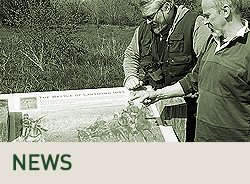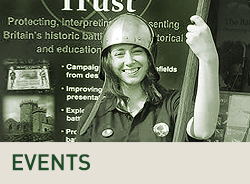Welcome to the Battlefields Trust Education Resource Packs.
The Battlefields Trust has created a number of education resource packs for use in schools, colleges and youth groups. Each pack contains a range of materials designed to assist teachers and group leaders in the creation and delivery of lessons and / or projects centred on an individual battle and its related history. Much of this material has been specially commissioned by the Trust and has been created under the guidance of experienced teachers. The material is suitable for use with a range of age groups and is intended to support the needs of individual teachers and group leaders in the creation of lessons and / or projects suitable for their particular requirements.
The content of the individual packs varies but typically includes:
- A brief description of the battle in its historical context, a note of the main protagonists and a timeline
- A specially commissioned map of the battlefield showing the participants and details of the action
- Background notes on the period and the nature of warfare at that time
- A walker’s guide to the battlefield to support group visits
- A selection of primary and secondary source material with supporting notes
- A selection of suggested classroom activities
- A selection of illustrations both in colour and in black and white outline
- A PowerPoint slide show covering the important aspects of the battle
View Battle Resource Packs

OTTERBURN
The Battle of Otterburn was fought in August 1388, most probably on the 5th but other dates have been suggested. As part of a major Scottish raid into northern England a section of the Scots army launched a raiding attack which culminated in a confrontation with Sir Henry Percy (known to history and Shakespeare as ‘Hotspur’), eldest son of the Earl of Northumberland, and his brother Ralph who had been sent to Newcastle to lead resistance to the eastern side of the incursion. Following some inconclusive skirmishing outside the city the Scots withdrew. Hotspur pursued them and caught up with them to the west of the village of Otterburn in Redesdale, Northumberland. The battle was unusual in being fought in the failing light of evening. The engagement ended with a Scottish victory. Both Hotspur and his brother were captured and taken for ransom but the Scottish leader, James, Earl Douglas, was killed. Between 2017 and 2022 the Battlefields Trust led a major project at Otterburn as part of the Revitalizing Redesdale Landscape Partnership. This pack was created as a part of that work by Geoffrey Carter and John Sadler.
Click here to view

CARHAM
The 1018 Battle of Carham saw Northumbrian forces face the combined Scottish forces of two kings, Malcom II, King of Scots and Owen the Bald, King of Strathclyde. The Scottish victory is seen as a pivotal event in the establishment of the Scottish kingdom, it led to the fatal weakening of the Earldom of Northumbria; resulting in Northumbria beings unable to challenge the recent conqueror of England, Cnut. The ultimate result of the Battle was the determined of the eastern border of Scotland at the River Tweed. This pack has been produced in collaboration with the Carham 1018 Society http://www.carham1018.org.uk/
Click here to view

SHREWSBURY
The Battle of Shrewsbury was a battle fought on 21 July 1403 between an army led by the Lancastrian King Henry IV and a rebel army led by Henry "Harry Hotspur" Percy from Northumberland. The battle, the first in which English archers fought each other on English soil, ended with Hotspur’s death which finished the rebel challenge to Henry’s seizure of the throne from Richard II in 1399.
Click here to view

STOKE FIELD
The Battle of Stoke Field on 16 June 1487 may be considered the last battle of the Wars of the Roses. The Battle of Bosworth, two years previously, had established King Henry VII on the throne, ending the last period of Yorkist rule and initiating that of the Tudors. The Battle of Stoke Field was the decisive engagement in an attempt by leading Yorkists to unseat him in favour of the pretender Lambert Simnel.
Click here to view

NEWBURN FORD
The battle of Newburn Ford, fought on 28th August 1640 and was the only significant battle of the two Bishops’ Wars. Two days after the battle the city of Newcastle was surrendered to the Scots and King Charles I was obliged to recall Parliament to raise the money required to buy them off. The battle finally put an end to Charles’ 11 year period of ‘personal rule’ which, in turn, was a significant step towards the outbreak of civil war in 1642. The battle itself is a textbook example of how to conduct an opposed river crossing. There are few other examples to be found amongst English battles.
Click here to view

EDGEHILL
The battle of Edgehill, on Sunday 23rd October 1642, saw the army of the Earl of Essex, the parliamentarian Lord General, and the King’s army clash in the first major action of the Great Civil Wars. Although often viewed as an indecisive battle, the king actually gained an important advantage. Essex failed to break through and had to retreat northward to the security of the parliamentarian garrisons at Warwick and Coventry. This left the royalists in command of the road to London, and control of the capital was the key to the war.
Click here to view

The Battle of Worcester, the last battle of the Civil Wars, was fought on 3rd September 1651; nine years earlier the first substantial action of the war had taken place barely two miles to the south of the city, at Powick Bridge. Whereas that first skirmish had been a dramatic success for Prince Rupert's royalist cavalry, by 1651 it was parliament's New Model Army that was the dominant military force. This pack has been produced for the Battlefields Trust by Ian Binnie.
Resource Usage
Most of the material is provided in the form of pdf files. If users wish to adapt any of the content the Trust would be happy to provide editable MS Word files upon request.
The materials included in these packs are made available free of charge for educational use but copyright remains with The Battlefields Trust. None of the materials may be used for non-educational or commercial purposes without the prior written consent of the Trust.
For further information, please contact David Austin,
Director of Operations at Info@battlefieldstrust.com
Updates and Future Resources
The Battlefields Trust will be adding further educational resources in the future, so remember to bookmark this page






